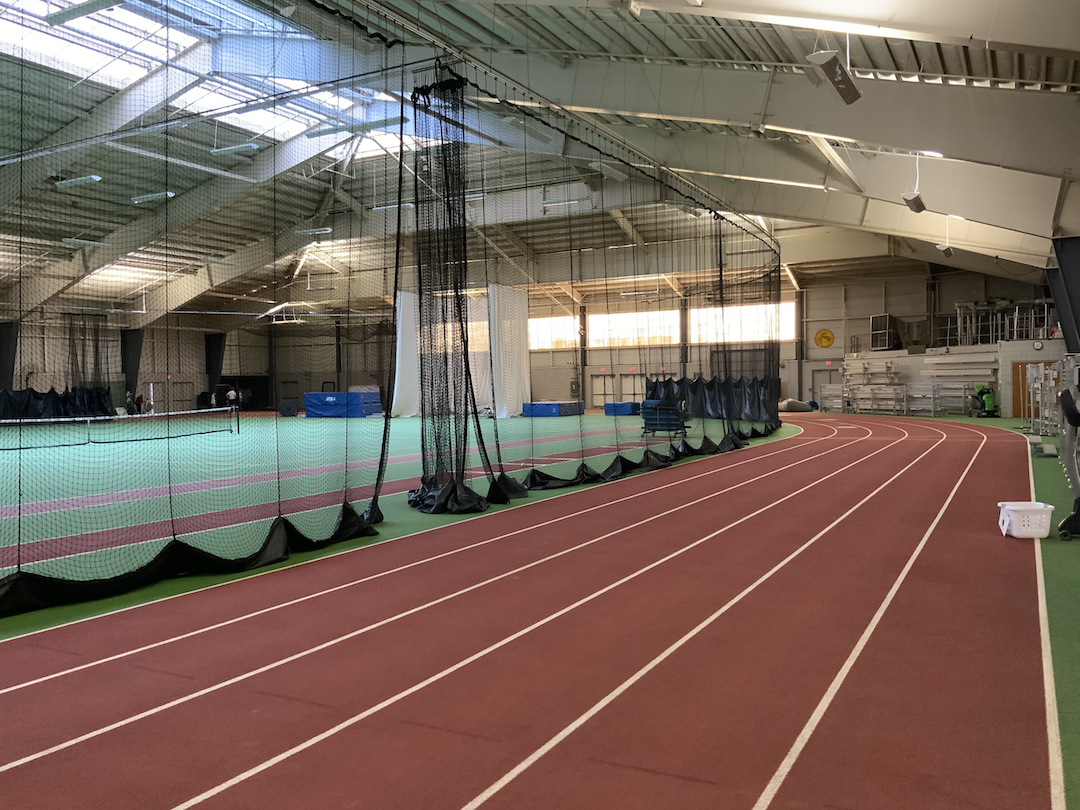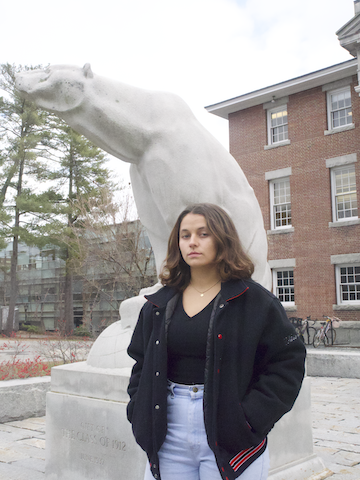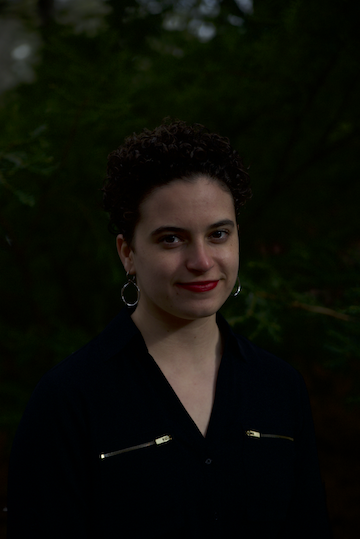The long haul: students navigate long Covid
December 2, 2022
In a Bowdoin Orient survey sent to the student body in October, nearly three-quarters of respondents said they had tested positive for Covid-19 at some point during the past two years. While the rates of Covid on campus dwindle and pandemic restrictions wane, there are continued implications of having once tested positive.
While data about the rates of long Covid on college-age adults is still emerging, the Center for Disease Control (CDC) found that nearly one in five adults in the U.S. who have tested positive for Covid experienced extended symptoms of the disease. As the College moves beyond the pandemic, the experiences of students navigating the symptoms and confusion of “long Covid” offer a window into the many broad and lasting impacts of Covid within the Bowdoin community.
Beyond testing positive
After testing positive for Covid last spring, Adele Metres ’24 went from running 35 miles a week to not being able to run a mile without losing her breath.
“I didn’t think it could be me, quite frankly… I felt like I would just be fine. And then I wasn’t,” Metres said.
As a member of the track team and a lifelong athlete, Metres did not imagine she would be someone affected by long Covid, let alone how much it would disrupt her life. She struggled to keep up with her summer job and academics while suffering from bouts of fatigue and headaches months after testing positive. Unable to run without experiencing shortness of breath and chest pain, she is no longer able to participate in cross country and track practices this semester.
“I’ve always been someone who’s just super active,” Metres said. “Now I’ll just run in my dreams all the time. Because I think it’s such a deep part of who I am, but I’m not doing it during the day.”
Other common symptoms of long Covid are fatigue and the acute inability to focus, commonly called “brain fog.” Zoe Stilphen ’22 began noticing these symptoms following getting Covid last April, during a period when Bowdoin saw rates as high as 191 cases on campus at once. Previously, Stilphen was concerned about contracting Covid because of her asthma and considered herself lucky that her breathing ability was not affected while she was ill. However, she was not anticipating having other lasting symptoms.
“I think the brain fog is definitely something that kind of goes under the radar in a lot of cases, and you might not suspect it, but it really is something that comes in a lot of ways from having this infection,” Stilphen said. “[I’m] seeing the different impacts that it has and how brain fog seems to be this overarching symptom that a lot of people who have long Covid experience.”
Stilphen’s experience with long Covid has influenced how she views the broader impact of the pandemic on both health and society. In addition to having brain fog, Stilphen also needed to adjust her eyeglasses prescription, a change her eye doctor said was associated with long Covid.
“I think in a lot of ways it’s been really hard to parse those things, but I think at the same time, this experience of having Covid and seeing the effects … made me really cognizant of how this has impacted people—and not just myself, but the people around me who I’ve also seen go through Covid: family members, friends, colleagues, etc.—and seeing how this affects individuals in more ways than one,” Stilphen said.
Looking for answers
Long Covid is defined by the CDC as having symptoms associated with Covid three months after initial infection. The wide range of symptoms of long Covid can become apparent immediately after infection, or arise weeks or even months afterwards. Long Covid symptoms are broad and can be difficult to identify. They can include respiratory and pulmonary changes, such as shortness of breath, chest pain and heart palpitations. Neurological changes have been associated with long Covid, including difficulty concentrating, fatigue, changes in taste or smell, and insomnia. Other symptoms include joint and muscle pain and changes in menstruation. While long Covid symptoms tend to slowly improve with time, they can last months or longer, resulting in a chronic disability. As of June, the CDC estimates that one in thirteen adults in the U.S. have long Covid.
Bowdoin Health Services is in the early stages of gathering information about how many students on campus have long Covid, what their symptoms might look like and how to best distribute information about long Covid. Director of Health Services Sandra Hayes emphasized that a key component of helping those with long Covid is knowing to look for it when assessing a wide array of symptoms.
“I would say we’re in the fact-gathering stage where we’re looking at how many of our students have long Covid, asking what does that look like and [if] are there common themes,” Hayes said. “So I think this will in the long run be sussed out… we were diagnosing other things we didn’t attribute to Covid in the past that we now realize are related to Covid.”
Health Services works with students and their primary care providers who have diagnosed them with long Covid to provide supportive care for their symptoms. Hayes said that she has worked with fewer than ten students specifically surrounding long Covid symptoms. However, students not formally diagnosed with long Covid by an external provider or dissuaded by the lack of knowledge surrounding long Covid do not always go to the Health Center with long Covid concerns.
Khushi Patel ’23 also contracted Covid during the spring semester. For months following testing positive, Patel experienced sporadic arthritic pain, a known long Covid symptom.
“I would wake up and all my joints would hurt, and it would be hard to open a water bottle or even write on paper… [To] pick up a book or pick up my iPad or a laptop would be hard, my hands would start shaking. I need to be able to write, I need to be able to type, but it physically hurt,” Patel said. “I just took Ibuprofen on those days, and then it was manageable but still very inconvenient.”
The irregularity of her symptoms and the lack of known treatment for arthritic pain caused by long Covid deterred Patel from seeking external therapies to add to her already busy schedule.
“I should have gone to the Health Center in retrospect, but I was like, what are they going to be able to do? Like yeah, they would probably give me painkillers or send me to [physical therapy] which would just take up time and not really do much,” Patel said.
Health Services also screens student athletes who have tested positive to ensure they are not experiencing extended symptoms and can undergo physical activity without cardiac or pulmonary stress. This is followed by a screening from an athletic trainer prior to returning to the field.
If a student athlete does not pass an initial health clearance, they either wait a few weeks to be screened again, receive additional testing from Health Services such as bloodwork, or are referred to an external clinic for further assessment. Yet additional testing does not guarantee that students find clarity about the impact of having Covid.
When Anju Chenaux-Repond ’25 went to get cleared to return to rowing after having Covid last spring, Health Services told her that she had an abnormality with her heart rhythm. Due to her rigorous training and physical testing for a triathlon in her home of Hong Kong prior to coming to Bowdoin, Chenaux-Repond knew that this irregularity was new.
However, the echocardiogram she received at Mid Coast Hospital did not find anything wrong. As Health Services maintained that Chenaux-Repond still had a pulmonary irregularity but could not find anything specific on a test, she was allowed to return to the crew team with caution. While Chenaux-Repond has mostly felt physically fit, the thought that she could have a heart murmur loomed every time her heart beat particularly fast.
“I was like, ‘Is that placebo? Or did that actually just happen, is something wrong with my heart?’” Chenaux-Repond said. “I’m still kind of grappling with that idea that maybe Covid did have a long-lasting impact on my life that maybe can’t be found on a heart echo, but it’s still actually just as real.”
Even when getting treated by personal care providers outside of Bowdoin, students are met with mixed messages from their physicians about the effect Covid had on their health and treatment options available.
“I’ve heard a real range of ‘Oh, you’re fine. Your scans are normal. Nothing is wrong. You should run,’ and ‘No, like there are things going on that we can see and there are things that we can do to help,’” Metres said.
Metres now takes a steroid inhaler each morning and a range of supplements. After publishing a Talk of the Quad in the Bowdoin Orient about her experience with long Covid, Metres finds herself fielding questions from students about whether their symptoms mean they too have long Covid. She refers them to Health Services.
 Ezra Jones
Ezra JonesThe long game
Associate Dean for Student Affairs and Dean of Student Life Katie Toro-Ferrari helped coordinate student testing and positive case isolation when she was hired at Bowdoin in the summer of 2020. In a newer consideration of the pandemic this semester, she has been regarding what students experiencing long Covid need to feel supported and seen by the College.
“My concern is always that if it’s not visible and doesn’t feel like it’s this burning issue that we have to address, then we’re missing it,” Toro-Ferrari said. “[Long Covid] is so real. And I think it’s real in terms of the day-to-day limitations that you have to navigate, but also just the isolation that you feel. And that is the part that really worries me.”
Toro-Ferrari and Hayes have been working to frame how to best support students with long Covid from both a medical and social perspective. Toro-Ferrari is considering offering a gathering space or facilitating conversations for students with long Covid to share their experiences and offer support for one another. However, she is still grappling with how best to meet these students’ needs.
“I worry about students feeling really isolated in their experience of long Covid… I’m just not really sure how to identify them and offer them resources,” Toro-Ferrari said. “Whether it’s students who are having weird symptoms and aren’t really sure what to do with it, or students who have it and are just feeling Bowdoin moving on from the pandemic. [It] is creating this cognitive dissonance for them based on the very real symptoms that they have managed and the reality of everybody else [thinking] the pandemic is over.”
Metres felt as if the campus community was moving on as she dealt with the impacts of Covid.
“I think that the worst part of it, in many ways, has been going back to a place where I feel like we’re just so done with Covid that there are no rules about you know, anything,” Metres said. “It doesn’t seem like there’s a sense of … someone could get Covid and have really, really bad impacts from it. And they’re not always going to be those who you think will have that happen to them.”
Despite the ups and downs of managing long Covid symptoms day-by-day, Metres is determined to heal and run again someday.
“I’m seeking to try to find some sort of attitude of gratitude, even though yeah, it really sucks,” Metres said. “I think that I know that I will heal, and I know that I will run again and I think making that choice is actually a huge thing. But I don’t know how long it may be.”



Comments
Before submitting a comment, please review our comment policy. Some key points from the policy: